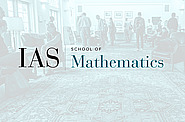Seminars Sorted by Series
Members’ Seminar
Mar
15
2021
Members’ Seminar
Estimating the mean of a real valued distribution
2:00pm|Simonyi Hall 101 and Remote Access
Milnor Conjecture Learning Seminar
Nov
04
2022
Nov
11
2022
Nov
18
2022
Milnor Conjecture Learning Seminar
The Beilinson-Lichtenbaum Conjecture
1:00pm|Rubenstein Commons, Room#5
Feb
03
2023
Feb
24
2023
Minerva Distinguished Visitor Lectures at Princeton University
Nov
09
2015
Minerva Distinguished Visitor Lectures at Princeton University
I: Geometry and dynamics on hyperbolic surfaces
4:30pm|McDonnell A02, Princeton University
Nov
11
2015
Minerva Distinguished Visitor Lectures at Princeton University
II: Dynamics on moduli spaces of hyperbolic surfaces
4:30pm|McDonnell A02, Princeton University
Nov
13
2015
Minerva Distinguished Visitor Lectures at Princeton University
III: Counting mapping class group orbits on hyperbolic surfaces
4:30pm|McDonnell A02, Princeton University
Minerva Mini-Course
Oct
23
2015
Minerva Mini-Course
An overview of Benjamini-Schramm convergence in group theory and dynamics
Lewis Bowen
1:30pm|Fine 110, Princeton University
Oct
30
2015
Minerva Mini-Course
$L^2$ invariants and Benjamini-Schramm convergence
Lewis Bowen
1:30pm|Fine 110, Princeton University
Nov
20
2015
Minerva Mini-Course
When does injectivity imply surjectivity?
Lewis Bowen
1:30pm|Fine 110, Princeton University
Nov
23
2015
Minerva Mini-Course
Classification of Bernoulli shifts
Lewis Bowen
4:30pm|Fine 314, Princeton University
Dec
04
2015
Minerva Mini-Course
Ergodic theorems beyond amenable groups
Lewis Bowen
1:30pm|Fine 110, Princeton University
Mini conference on Arithmetic Combinatorics
Dec
10
2007
Mini conference on Arithmetic Combinatorics
Extractors, Ramsey Graphs and Arithmetic Combinatorics
11:00am|Simonyi Hall 101
Dec
10
2007
Mini conference on Arithmetic Combinatorics
Quadratic Littlewood-Offord and rank of random symmetric matrices
Kevin Costello
12:00pm|Simonyi Hall 101
Dec
10
2007
Mini conference on Arithmetic Combinatorics
Nilsequences in ergodic theory and additive combinatorics
2:00pm|Simonyi Hall 101
Dec
10
2007
Mini conference on Arithmetic Combinatorics
On Erdos square sum free problem
Hoi Nguyen
3:00pm|Simonyi Hall 101
Dec
10
2007
Mini conference on Arithmetic Combinatorics
Arithmetic progressions in Salem sets
Izabella Laba
4:00pm|Simonyi Hall 101
Dec
11
2007
Dec
11
2007
Mini conference on Arithmetic Combinatorics
Discrete Kakeya-type problems and small bases
12:30pm|Simonyi Hall 101
Dec
11
2007
Mini conference on Arithmetic Combinatorics
Gowers norms in characteristic two
2:00pm|Simonyi Hall 101
Dec
11
2007
Mini conference on Arithmetic Combinatorics
The hyperbolic lattice point count in infinite volume with applications to sieves
3:00pm|Simonyi Hall 101
Dec
11
2007
Mini conference on Arithmetic Combinatorics
Variants of the sum-product problem
4:00pm|Simonyi Hall 101
Dec
11
2007
Mini conference on Arithmetic Combinatorics
Tits alternative and arithmetic heights
4:30pm|Simonyi Hall 101
Dec
12
2007
Mini conference on Arithmetic Combinatorics
Transcendence of automatic numbers
Yuri Bilu
11:00am|Simonyi Hall 101
Dec
12
2007
Mini conference on Arithmetic Combinatorics
Waring problem with the Ramanujan τ-function
12:00pm|Simonyi Hall 101
Dec
12
2007
Mini conference on Arithmetic Combinatorics
Pretentiousness in analytic number theory
2:00pm|Simonyi Hall 101
Dec
12
2007
Mini conference on Arithmetic Combinatorics
Sidon sets and the distribution of powers in F_p
Javier Cilleruelo
3:00pm|Simonyi Hall 101
Dec
12
2007
Mini-Course
Mini-Course in Geometric PDE
Oct
07
2008
Mini-Course in Geometric PDE
Fully Nonlinear Equations in Conformal Geometry
Matt Gursky
1:30pm|S-101
